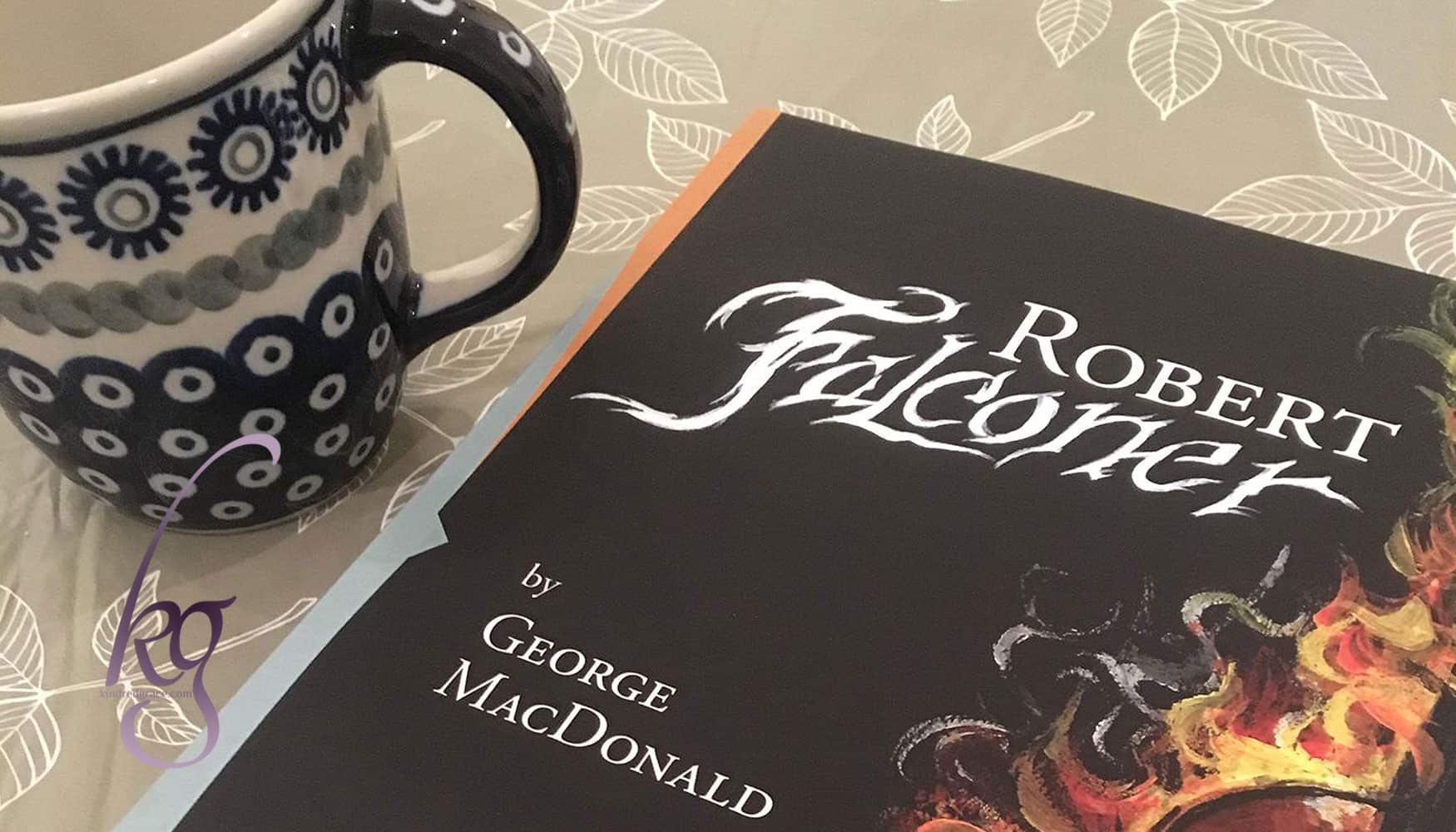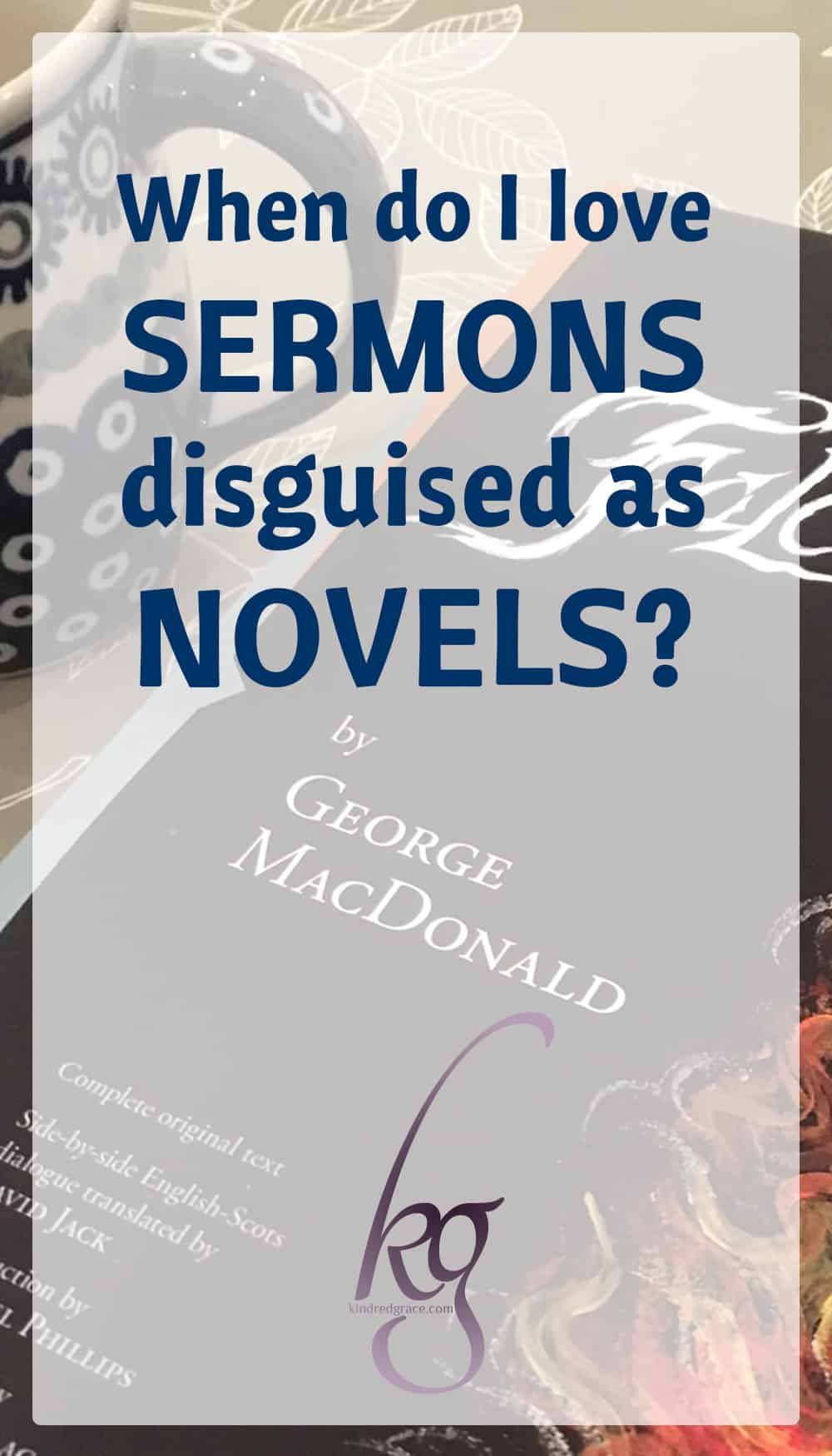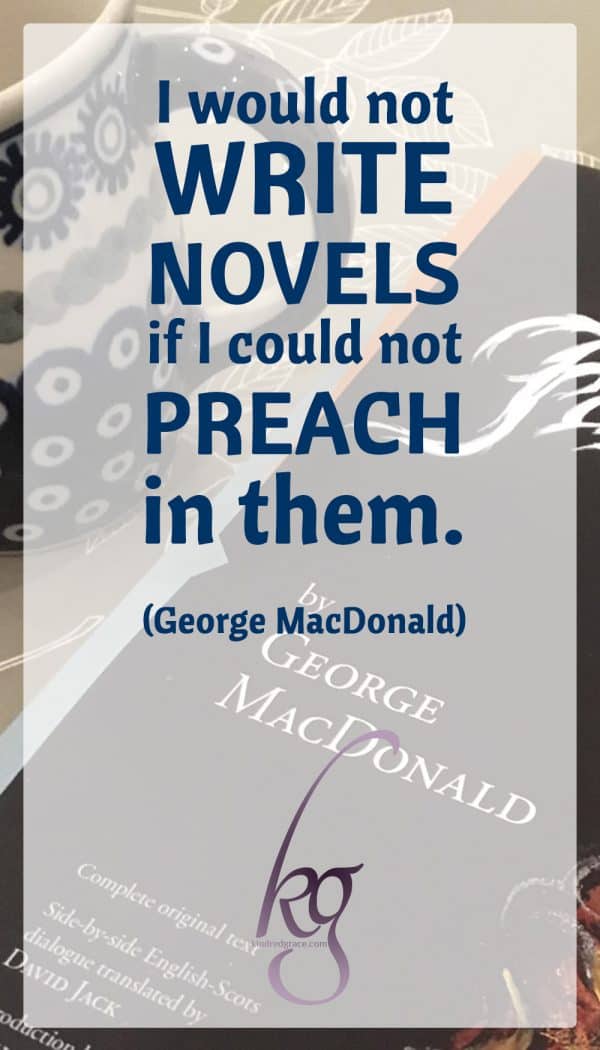When Do I Love Sermons Disguised As Novels?
Disclosure: This post contains affiliate links which won’t change your price.
“You’re going to love this one.”
She said it every time she gave me a book.
The first time I met Judy, we argued theology. She taught me about mothering—by example. She was there for my first home birth, encouraging me with every breath I took. Birthdays, holidays, and more births—our friendship grew.
Judy introduced me to R.C. Sproul and John Gerstner. But of all the wonderful memories I have of her, my favorite is the day she brought over The Lost Princess and introduced me to George MacDonald.
I fell in love with all his fairy tales after that. At the Back of the North Wind. The Princess and the Goblin and The Princess and Curdie.
Then, as if she’d been preparing my literary palate, she gave me my first MacDonald novel: The Fisherman’s Lady, edited and translated by Michael Phillips. After being introduced to Malcolm, I met Sir Gibbie, and finally Robert Falconer.
Twenty years passed. My friend Judy moved. I kept reading, and then I began writing. That led me to the wonderful world of Facebook and reader groups where one day I saw a post in a group called Avid Readers of Christian Fiction. A man named David Jack had translated another book by George MacDonald: Robert Falconer. I had to have it, of course.
Was I in for a surprise!
I was in the middle of a project when Robert Falconer arrived, so I wasn’t anticipating it like I usually do when tomes of tree carcasses are due to arrive. I expected the package to be one of the many review copies that show up in my mailbox each month, and wondered which title was so heavy! As the cardboard wrapping fell away, an enormous paperback dropped into my lap. Seven by ten inches. Over an inch thick!
I vaguely remembered reading that the Scots dialect as written by MacDonald was offered side by side with an English translation, but I hadn’t considered the fact that there would be double the text anywhere someone spoke.
Robert Falconer sat on my shelf with my other “to be read” pile for many months. But the time came and I sat down and began reading.
The first words—soothing. Immediately, the cadence of MacDonald’s storytelling style wrapped itself around my heart and made itself comfortable there. I could almost hear Judy telling me I was going to love this one. By the third chapter, a different kind of joy filled me.
I knew this story. I’d read it before in The Musician’s Quest, which Michael Phillips had edited for modern readership. In this Scots-English edition, David Jack had translated all of the Scots dialogue, publishing it alongside all the rest of the original book.
What is so appealing about Robert Falconer?
Maybe it’s the setting. MacDonald wrote of places he knew—perhaps never more so than in Robert Falconer, which has deep roots in his own life. According to the introduction (written by Michael Phillips), MacDonald even named a son Robert Falconer MacDonald.
He writes of life in Scotland much as contemporary American authors do about life in America—as a matter of fact. We see this 19th-century world without explanation and yet it is so natural to him, so a part of him, that even things that might have eluded us due to their unfamiliarity, don’t.
While people often compare the book to Charles Dickens’ David Copperfield, and while those comparisons aren’t without merit, Robert Falconer has one distinct advantage in my opinion. The description isn’t overdone: We can enjoy the story without being expected to be so impressed by the myriad of insignificant and tedious details often found in Dickens’ works. Yes, there is description to anchor us in each place, but it always serves a truer purpose.
Then there are the characters.
George MacDonald never writes a one-dimensional character. In his people we see virtue and vice–much to admire and some to condemn, and vice versa. Early in the novel, the character of Double Sanny provides an excellent example of this. Double Sanny is only a supporting character but we can’t help but admire him… until we learn that when drunk, he’s abusive to his wife.
And this is where MacDonald’s understanding of human nature shines. Double Sanny knows this about himself, genuinely loathes that it is so, and yet we’re left to assume that he also knows it’ll happen again.
The same is true of Falconer’s grandmother. The woman is a strict Calvinist, holding fast to the doctrines of election, but she still prays—against her own theology—that her son might be spared hell.
So, with a setting that feels like home the minute I stepped into the story, and characters I both admired and wanted to shake sense into, chapter twelve arrived. At that point, MacDonald abandoned subtlety, and I realized: Oh, yes!
Robert Falconer is more than the story of a young man searching for a father he never knew. Robert Falconer is a sermon on mankind searching for a Father we need to know.
My daughter laughed when I said how much I enjoyed the sermon. “You hate preachiness in books!”
And she’s right. I do. Usually.
When Do I Love Sermons Disguised As Novels?
The answer is so simple it’s a little embarrassing. I love sermons disguised as novels when George MacDonald is the preacher. Yes. That’s it.
Anyone who has ever wrestled with the theological issues of justice and mercy, salvation and condemnation, Heaven and Hell can identify with the character of Robert Falconer. Like many of us do when rejecting one idea (in this case, the doctrine of unconditional election), I think both Falconer and his creator swing a bit too far in the other direction.
In fact, MacDonald shows through his books (and sermons) that he wished to believe that somehow there would be no Hell. This, again, amused my daughter when she heard it.
“And you still like the book?”
Yep. What I like about the theology explored in Robert Falconer is the raw honesty of it.
This isn’t the story of a man who has everything figured out. This is a man’s journey to finding and understanding God and His love.
Do I agree with every conclusion? No. Would I give this book to someone just trying to understand what God has done for mankind through the sacrifice of His Son? I might—depending on the person—but probably not.
Then why do I love Robert Falconer so much?
Aside from MacDonald’s ability to write a “preachy book” without actually making me feel like I’ve been sermonized, Robert Falconer helps me understand why I have trouble accepting some theological viewpoints while also helping me understand why others have trouble accepting the theology I do.
This book isn’t a substitute for systematic Bible study to understand the mysteries of salvation. Robert Falcolner is just the warm, engaging story of a young man aching for a father’s love, finding it, and in the process, discovering the Father’s love.
“I like preaching best, then writing poetry, then writing stories…
I would not write novels if I could not preach in them.”
-George MacDonald
as quoted by W. Garrett Horder
in “Character Sketch: George MacDonald: A Nineteenth Century Seer”,
The Review of Reviews Vol XXXIII, July-December 1905
(Read more about MacDonald’s views on preaching at The Works of George MacDonald. See also the quotation from Ronald MacDonald on pages 112-113 of David Strachan Robb’s 1980 thesis on the Scottish novels of George MacDonald.)
Photo Courtesy of David Jack




When I saw the title “When Do I Love Sermons Disguised As Novels?”, my first thought was, “When George MacDonald is the author, of course!” And so I LOVED that this was actually your answer! I’ve been on a George MacDonald kick for the last couple of weeks, but I’ve never read Robert Falconer – I think I will read it soon! And this edition sounds AMAZING!!!!!
Very much enjoyed your review Chautona, two years to the day after this edition was published! I would argue, however, that MacDonald’s stance was more one of warning us of the hell that awaits us, should we hold on to our sin and reject Christ, than wishing there were no such place. Given that people do reject the Saviour, I believe he saw hell as a necessary part of God’s economy; but saw it as having a redemptive function, quoting the words from Jesus’ parable that no one would escape until they had paid the “uttermost farthing”.
I agree with you, David. I was very careful in how I worded that sentence because I’ve read accusations of Universalism attributed to him and I totally disagree. MacDonald did NOT reject hell, but you can see that he doesn’t like the fact of its necessity.
But who does? Who of us LIKES hell.
I just mentioned it because I wanted to show what I saw in the book to refute those claims of Universalism.
Yes, he certainly hoped for the reconciliation of all, and seemed to have a strong personal belief that God would achieve this, but “Universalist” would be an incorrect label because classic Universalism dispenses with hell altogether and (as far as I understand it) works on the assumption that all are already saved regardless of repentance and faith in Christ. This couldn’t be further from what MacDonald believed-as C S Lewis said “He hopes, indeed, that all men will be saved; but that is because he hopes that all will repent.”
EXACTLY. I always loved that Lewis quote. Isn’t it what we all want?